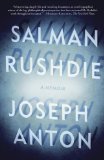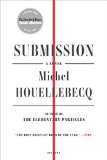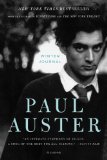Summary | Excerpt | Reviews | Beyond the book | Read-Alikes | Genres & Themes | Author Bio

Critics' Opinion:
Readers' Opinion:
First Published:
Sep 2012, 656 pages
Paperback:
Sep 2013, 656 pages
 Book Reviewed by:
Book Reviewed by:
Amy Reading
Buy This Book
When the Ayatollah Khomeini's death sentence against Salman Rushdie was announced on Valentine's Day of 1989, it instantly plunged Rushdie into at least four different battles. He was fighting for his life, of course, an unrelentingly anxious campaign to stay hidden from Muslim extremists which went on long after his cause made headlines. Second, he was fighting to propagate his own ideas about a secular Muslim culture, to which was now added the cause of free speech, amidst intense pressure to apologize for The Satanic Verses and back down. Third, he clashed with the British government, who never officially denounced the fatwa and only protected him grudgingly, believing that he was a troublemaker who was costing enormous amounts of money despite never having done the nation a service. Finally, he struggled mightily to maintain the creative space to continue writing fiction, which meant preserving his own solitude and strength of mind, but also battling publishers to keep The Satanic Verses in print and to take on new projects from the now-dangerous author.
Rushdie's memoir puts me in the position of greatly admiring the life but lamenting its literary representation. I couldn't put Joseph Anton down, despite all of the ways it let me down. This is a deeply flawed memoir by someone with a fascinating and immensely important story to tell. I recommend it with many qualifications.
Rushdie begins with an epigraph from The Tempest. The line in full, of which Rushdie quotes only the last three lines, is spoken by Antonio:
We all were sea-swallow'd, though some cast again,
And by that destiny to perform an act
Whereof what's past is prologue, what to come
In yours and my discharge.
We're meant, perhaps, to think of the opening of The Satanic Verses, in which two Indian men magnificently and protractedly fall from a hijacked airplane toward the sea, in the process transforming into Lucifer and the Archangel Gabriel, before landing on a British beach to lead new lives as expatriates. Rushdie himself made that journey from India to England, but it was The Satanic Verses that was his hijacked plane and that gave him a miraculous, eventful second life on the other side of a kind of social death.
Yet this is virtually the only echo that Rushdie makes between his literature and his life. Though I fully expected this author of magical realist novels to tell his tale of living under the reign of terror with irony and imagination, in Joseph Anton Rushdie has stripped away all of his own recognizable style. Gone is the exuberant language, the made-up words, the blending of myth, pop culture, and reality. Gone is the humor, even the blackish sort. Gone is the shapeliness. I had expected that the account of how he recaptured his voice under the fatwa would itself demonstrate his imaginative freedom, that the form of the memoir would redeem its content, that Rushdie would use literary style to counteract extremist politics and to transform his straightened circumstances into a kaleidoscope of words. Instead, Joseph Anton reads like it was written by a writer with one big grudge and many, many small ones, marching through his diaries of eleven years to settle every score, augmented by an archive of his papers and an army of graduate assistants. It gets very tedious in the middle of those 633 pages.
There is, of course, a political motivation behind his adherence to strict reportorial style. When he set out to write about the Prophet Muhammad from an unbeliever's perspective, he did not believe he was doing anything offensive. He thought his enthrallment with the culture of Islam and his treatment of the Prophet as a man inside history was respectful and engaged. He found himself perplexed and then enraged to have been so grievously misunderstood, first by Muslims in India, then in Britain, South Africa, and, finally Iran—most of whom hadn't read the novel. Five Muslims died when authorities fired on protestors at a "Rushdie riot" in Islamabad, Pakistan; three people died in India. Later, his Japanese translator was killed, and his Italian translator and Norwegian publisher were both attacked and grievously wounded. Even his own friends continued to misunderstand him after the fatwa. Robert Gottlieb, then-editor of the New Yorker, told everyone that he knew Rushdie wouldn't have written the novel had he known that people would die, thus robbing Rushdie of his own convictions. In Joseph Anton, Rushdie is taking no chances on being misread. He tells us exactly what he was feeling and doing throughout his long and surreal banishment from normality.
He also tells us the genesis of The Satanic Verses. Rushdie grew up in India the son of "a godless man who knew and thought a great deal about God." Anis Rushdie had invented his own surname in homage to Ibn Rushd, a 12th-century Spanish Arab philosopher who argued for rationalism against Islamic literalism. Anis passed down to Salman a fascination with the stories of the East along with an unwavering insistence on human reason and intellect against religious faith. As a student at Cambridge, Salman was the only one to sign up for a course on the rise of Islam, which he described as "his father's vision made real" for the way it depicted Muhammad as a flawed man within history.
Before he wrote his first word of fiction, Salman Rushdie became entranced with the so-called satanic verses of the Qur'an. The Prophet came down from the mountain one day and recited a verse praising three winged goddess, only to immediately retract the revelation, claiming that it had been given to him by Satan. To Rushdie, this episode is rife with meaning particular to the political climate in which Muhammad lived, his need to appeal to the people of Mecca, who worshipped the goddesses, without disturbing the centrality of Allah in the newly developing monotheistic religion. The satanic verses represent a moment in which the Prophet was tempted by worldly concerns. In Joseph Anton, Rushdie ends his otherwise excellent explication of this piece of history with an unnecessary bit of foreshadowing, something he resorts to throughout the book: "Good story, he thought when he read about it...Twenty years later he would find out exactly how good a story it was."
When your own personal life prompts and intersects with such giant events on the world stage, it is an inescapable hazard of the job to aggrandize yourself. Rushdie's regrettable solution is to refer to himself solely in the third person—moreover, in the impersonal third person, always "he" and never "Rushdie." This had exactly the opposite effect on me, reading not as modesty but as pretension, plus it forces him into many ungrammatical and downright confusing situations. Throughout the book, the name dropping is obnoxious, and Rushdie the memoirist lets through many clichés that Rushdie the novelist would have handily filtered out.
Joseph Anton will interest those who traditionally read biographies, but may disappoint readers who love literary memoirs with a strong voice and momentum. If The Satanic Verses meant something to you, then this story of a literary career waged at the very highest of costs will be riveting, as will his relentless campaign to keep the pressure on Iran and not let a leftist multicultural acceptance of Islam blind the world to its intolerance of secular thinkers and dissidents. Anyone curious about the backstage of writing and publishing will relish his tales of editors and writers alternately supporting and stabbing one another in the back.
There are many fantastic anecdotes sprinkled among the seriousness of the plot against him. It is impossible not to be compelled by the details of his security apparatus, though he bemoans how often people mistook for glamour what felt to him like prison. At the annual Secret Policeman's Ball—a real event that sounds invented at which Scotland Yard's security officers drink and dance with anyone who has ever been offered protection, world leaders coming together to honor the men and women who have guarded their lives—Rushdie finally meets Margaret Thatcher and they exchange pleasantries.
"He would never have guessed that the Iron Lady was a touchy-feely person. Throughout their brief conversation the former prime minister was putting her hands on him. Hello, dear, her hand resting lightly on the back of his hand, how are you getting along, her hand beginning to caress his forearm, are these wonderful men taking good care of you?, her hand on his shoulder now, he had better speak, he told himself, before she started caressing his cheek."
They get along well enough, until Rushdie's wife Elizabeth interrupts to demand that the British government do more to end the threats on her husband's life. Thatcher turns to her, and now it is Elizabeth's turn for some caressing, before Thatcher moves off, having not said a single significant word.
I loved the story of Fat Jack, one of Rushdie's protection officers, winning a stuffed animal for Rushdie's son Zafar at a carnival by shooting a target with terrifying accuracy. Several months later, when Zafar is watching television, he sees Nelson Mandela entering Wembley Stadium for a concert in his honor, and notices one of the men guarding him - "Look, Dad," he says excitedly, "there's Fat Jack!"
There are salacious stories, too, about literary feuds, and about his turbulent marriages to Clarissa Luard, the novelist Marianne Wiggins, Elizabeth West, and the celebrity Padma Lakshmi.
And there are hints of what the memoir might have been. He jokes that he first conceived of calling it Back Doors of the World: "Anybody could walk in the front door. You really had to be somebody to get in through the kitchen door, the staff entrance, the rear window, the garbage chute." He thinks of writing his life story, provisionally called Inferno, as "a hallucinatory portrait of a man whose picture of the world had been broken," but he later says that he does not believe "in the novel as a lace to escape into." He deplores reviewers who have read his novels as coded versions of his life, and by contrast he wants his life to stand as true in every respect. Nonetheless, one cannot help but wonder what Rushdie's work would look like had the fatwa not pushed him to straight, literal chronology of one detail plodding after another, had he not partly renounced his weapon of choice to shape the terms in which we regard the fatwa, had he evinced a bit more self-consciousness about his own literary reaction to political persecution.
![]() This review
first ran in the October 3, 2012
issue of BookBrowse Recommends.
This review
first ran in the October 3, 2012
issue of BookBrowse Recommends.

If you liked Joseph Anton, try these:

by Michel Houellebecq
Published 2016
Michel Houellebecq's new book may be satirical and melancholic, but it is also hilarious, a comic masterpiece by one of France's great novelists.

by Paul Auster
Published 2013
Facing his sixty-third winter, internationally acclaimed novelist Paul Auster sits down to write a history of his body and its sensations - both pleasurable and painful.





The House on Biscayne Bay
by Chanel Cleeton
As death stalks a gothic mansion in Miami, the lives of two women intertwine as the past and present collide.

The Flower Sisters
by Michelle Collins Anderson
From the new Fannie Flagg of the Ozarks, a richly-woven story of family, forgiveness, and reinvention.

The Funeral Cryer by Wenyan Lu
Debut novelist Wenyan Lu brings us this witty yet profound story about one woman's midlife reawakening in contemporary rural China.
Your guide toexceptional books
BookBrowse seeks out and recommends the best in contemporary fiction and nonfiction—books that not only engage and entertain but also deepen our understanding of ourselves and the world around us.